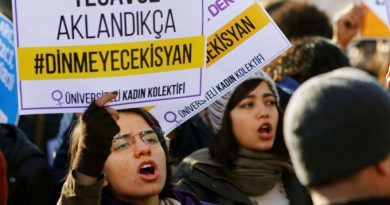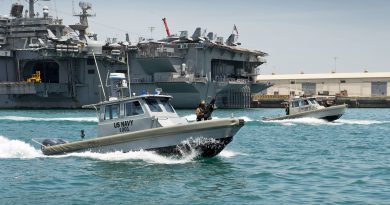Blast at north Iraqi airport raises tension in Kurdish area
Baghdad (AP) — An explosion struck next to the Suleimaniyah International Airport in northern Iraq’s semi-autonomous Kurdish region Friday, local officials said.
The blast came days after Turkey closed its airspace to flights to and from the airport, citing an alleged increase in Kurdish militant activity threatening flight safety.
Turkey has spent years fighting Kurdish militants in its east. Large Kurdish communities also live in neighboring Iraq and Syria where they have a degree of self-rule.
The Syrian Observatory for Human Rights, a U.K.-based opposition war monitor, and some local media reported that the explosion was a Turkish drone attack on Mazloum Abdi, the leader of the Syrian Democratic Forces, the main U.S.-backed and Kurdish-led force in Syria.
Officials with the SDF and the Kurdish regional government in northeast Syria denied that Abdi was in Suleimaniyah at the time or had been the target of an attack.
Fethullah al-Husseini, a representative of the Kurdish self-rule administration in northeast Syria, said Abdi was “carrying on his work and is in northeast Syria.”
The airport’s security directorate said in a statement that an explosion took place near the fence surrounding the airport at 4:18 p.m. local time, causing a fire but no injuries. It said the cause of the blast was under investigation and the airport was operating normally.
Lawk Ghafuri, head of foreign media affairs for the Kurdish regional government in Iraq, said investigations were still underway and that he was unable to confirm whether the explosion had been a drone attack.
However, a statement from the Iraqi Kurdish regional government appeared to blame local authorities in Suleimaniyah, which it accused of provoking an “attack” on the airport and using “government institutions” for “illegal activities.”
The regional government, with its seat in Irbil, is primarily controlled by the Kurdish Democratic Party, while Suleimaniyah is a stronghold of the rival Patriotic Union of Kurdistan.
Qubad Talabani, deputy prime minister of the regional government and a member of the PUK, rejected the regional government statement that appeared to cast blame on his party. He said the statement “represents only one party … and cannot speak for the entire government.”
Two Kurdish officials in Irbil, who spoke on condition of anonymity because they were not authorized to discuss the incident with reporters, said that the explosion was caused by a drone attack. One of them said the attack had targeted Abdi.
A representative of the Turkish defense ministry said he had no information about the incident.
Turkey’s foreign ministry announced Wednesday that Turkish airspace was closed to flights taking off from and landing at the Suleimaniyah airport.
Turkish officials said the closure was a response to an alleged increase in the activities of the banned Kurdistan Workers’ Party, or PKK, in the city of Suleimaniyah, including its “infiltration” of the airport.
The decision came weeks after two helicopters crashed in northern Iraq, killing Kurdish militants who were on board. The incident fueled claims that the PKK was in possession of helicopters, infuriating Turkish authorities.
The SDF later said it lost nine fighters, including a commander, in the crash, which occurred during bad weather on a flight to Suleimaniyah. The nine included elite fighters who were in Iraq as part of an “exchange of expertise” in the fight against the Islamic State group, the SDF said.
Officials from the Kurdish Democratic Party, which has maintained largely good relations with Turkey, alleged after the crash that the helicopters had been originally purchased by the rival Patriotic Union of Kurdistan and that they had been flying without permission from the regional government.
The Kurdish regional government was forced last month to stop exporting nearly half a million barrels of oil through via a pipeline to Turkey. That followed a decision by the International Chamber of Commerce siding with the central Iraqi government in Baghdad in a long-standing dispute over the independent export of oil by the Kurdish region.



